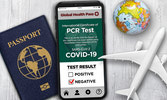COVID-19 testing is important in order to help people determine if they are infected with the virus, regardless of whether they have symptoms and if they are at risk of spreading the infection to others. Taking measures to prevent the spread of infection will be the most effective strategy to protect your family and the people you encounter.
What Is a PCR Test?
A PCR (Polymerase Chain Reaction) test is a molecular test and one of the two major types of tests for the COVID-19 virus (the other being the antigen test). A PCR test detects the presence of the virus’s genetic material (RNA) or its fragments as it breaks down. This is the most reliable and accurate test for detecting active infection. It can:
- Help identify people who are contagious to others (including asymptomatic)
- Be used to determine who has an active infection
How Does It Work?
Polymerase chain reaction (PCR) is a common laboratory technique used in research and clinical practices to amplify or copy small segments of genetic material. The PCR testing process goes like this:
- Sample Collection: The testing process begins when the healthcare worker collects a sample from the individual using a nasal swab or saliva tube. There are different types of nose swabs, including ones that collect a sample inside your nostrils and nasopharyngeal swabs that go deeper into the nasal cavity for collection. After collection, the swab is sealed in a tube and sent to the laboratory.
- Material Extraction: When the laboratory scientist receives the sample, they extract genetic material from the rest of the material in the sample.
- PCR Test: Scientists use PCR technology to amplify small amounts of RNA from specimens into DNA. After many cycles, millions of copies of a small portion of the COVID-19 virus’s genetic material are present in the test tube. One of the chemicals in the tube produces a fluorescent light if COVID-19 is present in the sample. Once amplified enough, the PCR machine can detect this signal. Scientists then use special software to interpret the signal as a positive test result.
The PCR test has been the gold standard test for diagnosing COVID-19 and is an accurate and reliable test.
Who Should Get Tested?
If you suspect you have COVID-19, have been around someone who has it or have been in contact with someone who may have been exposed to it, it’s important to get tested. If you are feeling sick and exhibiting any of these symptoms, get tested:
- Shortness of breath or difficulty breathing
- Cough
- Sore throat
- Congestion or a runny nose
- Fever or chills
- Fatigue, muscle or body aches
- Headache
- Loss of taste or smell
- Nausea or vomiting
- Diarrhea
Not everyone with COVID-19 is symptomatic and not all people with symptoms will exhibit the ones listed above. Consult with your healthcare provider if you’re not feeling well during the COVID-19 pandemic, even if you’re vaccinated.
Rapid PCR Testing for Travel
If you plan on traveling, a rapid PCR test is required. Many airlines and travel destinations now require proof of a negative PCR COVID-19 test. Advanced Care Respiratory Network offers rapid PCR testing and will be providing documentation for travel or occupational health and safety documentation.
Where Do I Get Tested?
If you need to take a COVID-19 test, Advanced Respiratory Care Network is here to help! We offer Rapid Antigen, Rapid Antibody and Travel PCR testing in partnership with Promedica Canada. Testing can be done at ARC locations listed on our website. Test pricing starts at $40 for antigen and antibody testing. Book your appointment now by contacting us at 1-866-521-2726 or email at covidtest@arcnetwork.ca.

